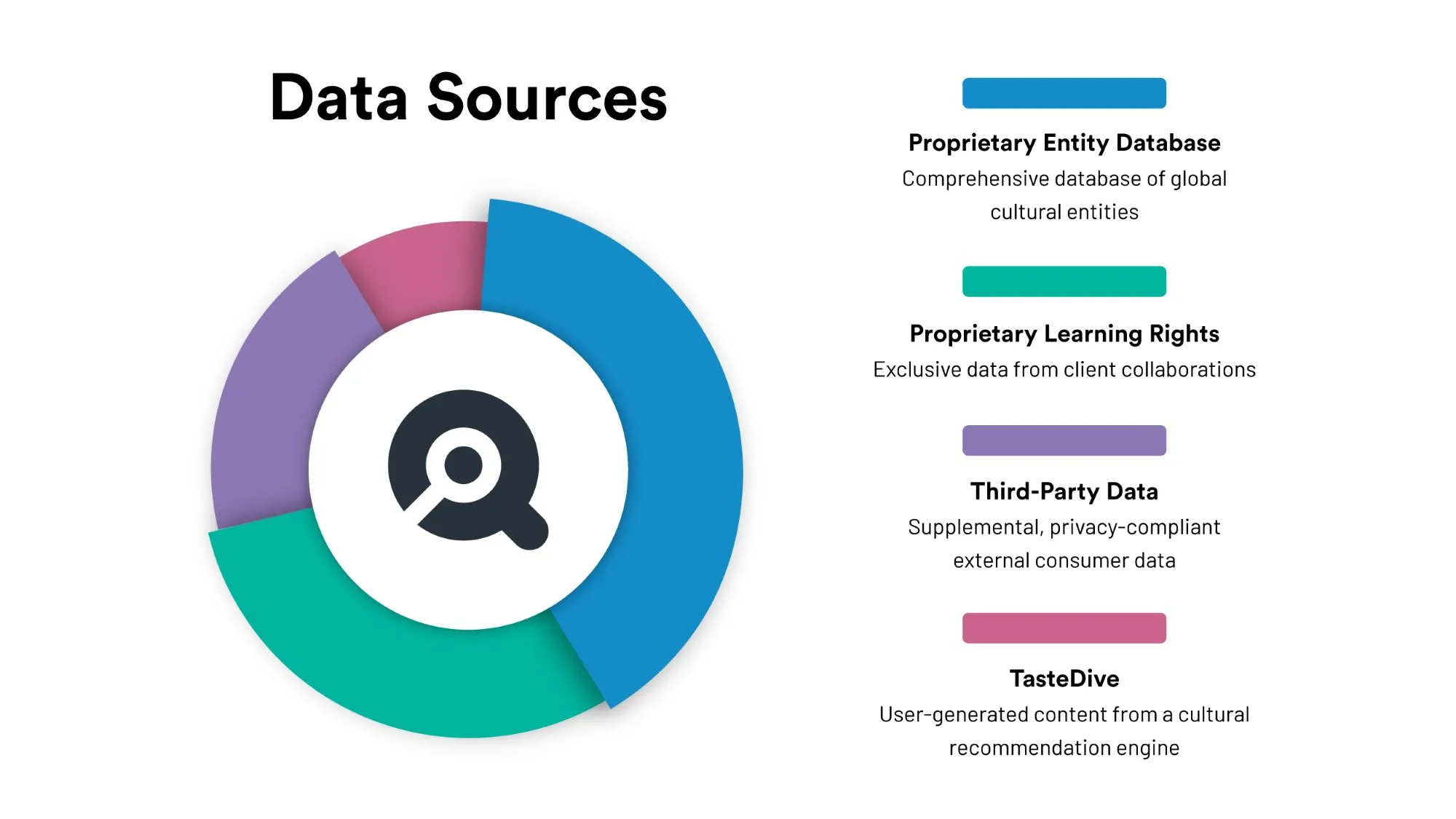
Key takeaways
- Qloo maintains and analyzes over 3.7 billion records of cultural entities and over 10 trillion consumer sentiment data points to deliver precise insights into global consumer preferences without relying on personally identifiable information (PII).
- Through a blend of proprietary data and open-source knowledge bases, Qloo creates a uniquely comprehensive and accurate cultural intelligence database.
- Regular updates from diverse data sources, including first-party data, exclusive partnerships, and rigorously selected third-party data, ensure Qloo’s insights remain current, relevant, and at the forefront of cultural trends and consumer behavior and sentiment.
- Because Qloo’s AI is trained on billions of real-time data points, clients are able to employ the latest output to help drive revenue, conversion, efficacy, and other key KPIs.
1. Proprietary entity database
At the heart of Qloo’s cultural intelligence engine is our proprietary entity database, a comprehensive catalog that captures the wide variety of culture and entertainment across the globe. With over half a billion unique records of people, places, and things, our database contains everything from the latest blockbuster hits and emerging indie darlings to undiscovered culinary gems and trending travel locations.
This database is a combination of hand-curated, highly specialized entity data and information created by Qloo and sourced from publicly available, open knowledge bases like Wikidata and MusicBrainz. We’ve developed our entity database through extensive manual curating, cataloging, and tagging, which is then enriched and expanded with corroborating cross-reference data from external, open-source repositories. We then de-duplicate, normalize, and structure the entities, ensuring our data is meticulously organized and refined to ensure accuracy and relevance. We also obtain and structure relevant metadata—such as menu items, literary genres, or the actors in a specific movie—to further enhance and refine our insights. Through this analysis, we’re able to learn the qualities of these entities beyond just factual details.
2. Proprietary learning rights
Qloo has obtained billions of proprietary data points and contractual learning rights through our direct collaborations with clients via Qloo’s core API suite. This means we have access to specific data under strict agreements, allowing us to customize our technology to meet needs that aren’t covered by publicly available information. In turn, we’re also able to strengthen and refine our AI model with the addition of specific, structured data.
For example, a premier restaurant reservation platform partnered with Qloo to deepen its understanding of diners’ preferences. By integrating anonymized reservation data—such as restaurant choices, visit frequency, and culinary patterns—we can develop a nuanced model that predicts dining preferences and trends. This collaboration allows the platform to offer more personalized dining recommendations to its users while simultaneously enriching our own database and continuously training our machine learning models.
Our partnerships have also given us access to anonymized transaction data, which offers invaluable insights into consumer behavior without compromising individual privacy. This combination of exclusive, proprietary insights guarantees that our cultural intelligence engine remains at the forefront of innovation while being grounded in truth through actual consumer behaviors and preferences.
3. Third-party data
We use rigorously selected third-party data to supplement our proprietary data, capturing billions of digital interactions weekly. We don’t collect any PII, nor do we use any cross-client identifiers like cookies—we strictly adhere to privacy regulations including the GDPR and the CCPA, ensuring that our data-gathering processes are both compliant and respectful of user privacy.
Our third-party sources include, but are not limited to, reviews from major online retailers, location data from mapping services, and interaction data from across the web (for a list of up-to-date second and third-party sources, contact us). Each source is selected based on its reliability and the richness of the data it provides. For example, reviews or interaction data can offer insights into consumer sentiment towards products, places, and experiences, while location data helps us understand geographical trends and preferences. We’re able to identify sentiment and behavior related to both implicit actions, like transactions, streams, or views, and explicitly declared sentiment, like ratings or follows.
Our data is regularly updated to ensure that our insights remain current and in touch with the latest trends. High-priority data sources, like popular venues or trending topics, are updated more frequently, often daily, to accurately convey real-time sentiment. Other sources might be refreshed on a weekly or monthly basis, depending on their volatility and impact on our models.
4. TasteDive data
Finally, another important data source is our TasteDive data. TasteDive is a cultural recommendation engine and social community that helps consumers discover like-minded people and new things to watch, read, listen to, and play based on their unique preferences. It is the only user-generated content (UGC) platform that traverses all categories of media, entertainment, brands, and geospatial categories like dining and travel.
In 2019, Qloo acquired TasteDive, and with over seven million active users around the world curating their tastes with TasteDive, we have access to structured subject data on cultural entities and hundreds of millions of anonymized user-generated data that reflect genuine user interactions and sentiments. TasteDive also powers a recommendation API ecosystem covering all categories of culture and entertainment, with thousands of developers on board. This offers a direct window into what people love, hate, and everything in between, serving as a crucial component of our analytical foundation.
%202.svg)